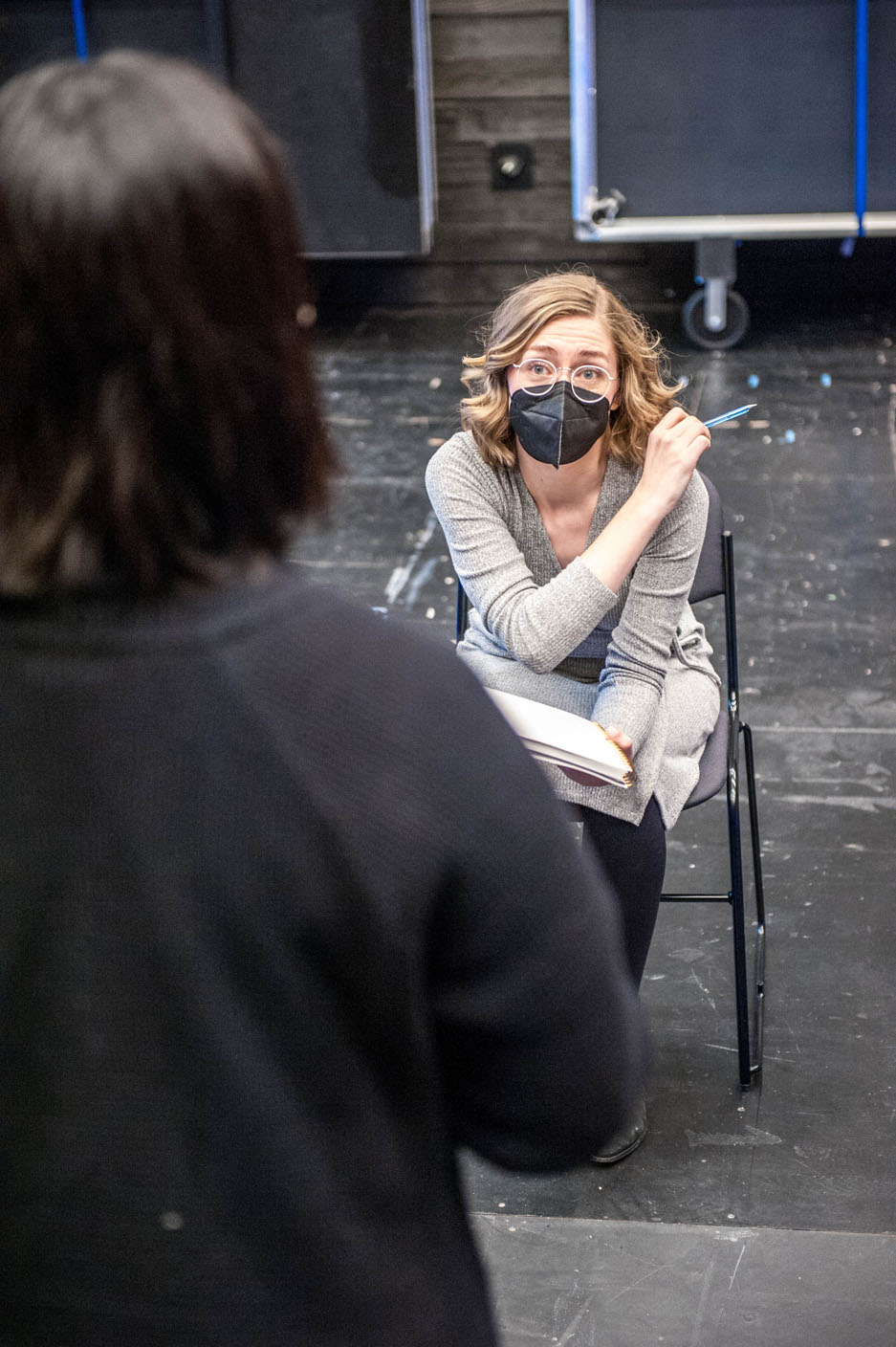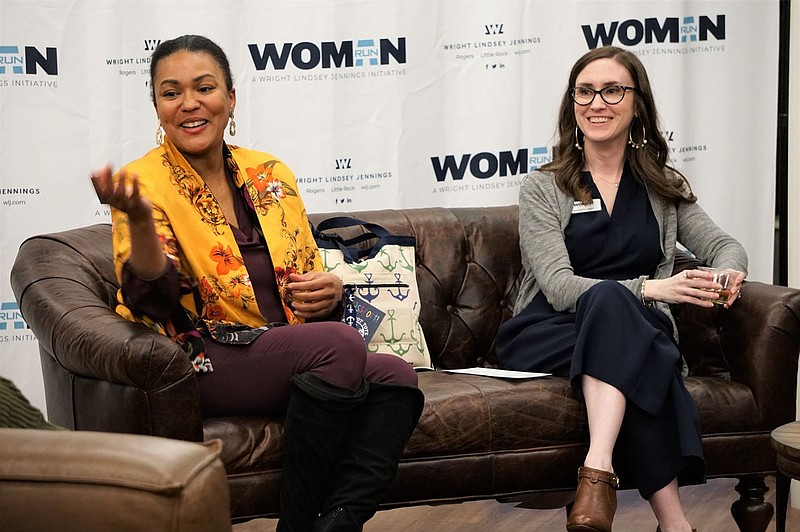Meredith Lowry knows about the barriers women face to attain success in the business world. A partner at the law firm Wright Lindsey Jennings, Lowry has worked her way to the top of the male-dominated field of intellectual property -- one of only a handful of women in Arkansas to do so. But Lowry is not content to sit back and enjoy the view from the top: An avid booster of myriad Northwest Arkansas nonprofits, giving back is in her DNA, and Lowry is determined to give a hand up to other women. One of her efforts in this area is her work with Woman-Run, a Wright Lindsey Jennings initiative started in 2019.
"It's a program to provide education and networking to women across the state that are either wishing to start a business or running a business already, so that they can create a network," explains Lowry. "We found through lots of research that networks are important -- the ability to say, 'Oh, wait, I need a banker,' or 'I need someone that does social media marketing,' 'I need venture capital.' Men historically go to their buddies and say, 'Hey, I need an accountant.' Women don't have the same bridges into the normal networks that men do. Men grew up going to Rotary and Chamber meetings; most women didn't."
And now, with TheatreSquared, Lowry has found another way to help break the glass ceiling for the female entrepreneurs of Arkansas. In partnership with Lowry, TheatreSquared announced "Barrier Breakers," a Feb. 17 event that, according to the T2 website, is designed to help women "gain confidence, develop their pitches and learn how to navigate the unique business challenges facing women and minority business owners" by teaching them skills that are "transferable to other scenarios such as job interviews or conducting board meetings."
Lowry says this type of event has been percolating in her head since she learned of the disparities in business funding between men and women.
"Women have historically gotten very little venture capital," notes Lowry. "There have been theories out there as to why: 'Women aren't starting businesses that need it' or 'They're going in and asking for too little.' Then there's also the issue of the venture capitalists -- most of them are men. Are they discriminating because of that? And the answer is yes to both. Women do tend to not go and get venture capital money, but even when they do, they don't succeed."
This is firmly backed by extensive research. Lowry cites a startling 2018 paper titled "We Ask Men to Win and Women Not to Lose: Closing the Gender Gap in Startup Funding," written by researchers from Columbia and Harvard business schools and Columbia University. These researchers conducted a field study on question-and-answer interactions at TechCrunch Disrupt New York City during 2010 and 2016. They discovered a distinct gender bias in the questions posed to men versus women.
"Investors tend to ask male entrepreneurs promotion-focused questions and female entrepreneurs prevention-focused questions, and that entrepreneurs tend to respond with matching regulatory focus," reads the paper's introduction.
The researchers say examples of promotion-based questions include "How do you want to acquire customers?" and "How do you plan to monetize this?" while prevention-based questions include "How many daily and weekly active users do you have?" and "How long will it take you to break even?" That simple shift in perspective means a huge difference in funding: Statistically, women own 38% of businesses in the U.S. but only receive 2% of venture funding.
But the researchers discovered a solution that changes the math significantly: When women were posed a prevention-focused question and gave an answer couched in promotion-focused language, their share of venture capital money was greatly increased .
"It's an astronomical amount -- it's 13 times more, $563,000 compared to $7.9 million more, on average, just by answering in promotion-based language," says Lowry.
And that's where TheatreSquared comes in. The company is already well-versed in using theater education to boost business skills, offering corporate workshops aimed at perfecting executive presence (public speaking, presentation and interpersonal skills), proactive listening, creative leadership, innovative thinking and adaptability to cultural change. Their adult theater training classes can also be beneficial to those hoping to become more comfortable in corporate settings.
"You're gaining confidence, you're gaining the ability to stand in front of people and feel OK," says Chad Dike, T2 director of education. "You're gaining collaboration skills, because you're working with people that you don't know very well. And those skills are applicable in any setting, whether you're wanting to feel more confident standing and talking in front of your board or when you're collaborating with your co-workers. It's also helpful in your personal life -- being more aware of and able to access your emotions, and being able to say, 'I can register what I'm feeling right now, because I have more of a mind/body connection.'"
The Barrier Breakers event will have a more streamlined focus: TheatreSquared teaching artists will help women seeking business funding -- or just a more confident mien in the boardroom -- change their linguistics to answer prevention-based questions with promotion-based answers.
"We can't change the types of questions women are being asked, but we can change the kind of answers they give," says T2 Education Specialist Emily Tomlinson. "There's a lot of data to suggest that the kind of questions they're being given are very different from their male counterparts, and they're going to continue to receive those questions. We can't fix the system, but we can equip them with responses that are going to serve them more."
Dike says he and Tomlinson have been immersing themselves in the research in order to advise women on how to answer a prevention-based question with promotion-based language, and they're essentially starting from scratch. Though existing research gives examples of the types of questions women can expect, there's no current body of work that suggests the appropriate linguistic switch training necessary to maximize funding.
"It's really fascinating," notes Tomlinson. "This isn't our typical work. We are not venture capitalists. But we are people with ideas, and we are familiar with the idea of going in and auditioning for something, which is what a pitch is like. We are definitely learning to speak a new language. It's been an awesome opportunity, to be introduced to an entire new world of information."
Lowry says when Woman-Run first started, the response was immediate and overwhelmingly positive. The same is true for Barrier Breakers.
"[When I started Woman-Run,] immediately, the question coming out of Central Arkansas was, 'When are you doing a meeting here?'" she says. "And that same thing is happening with Barrier Breakers. The women in Central Arkansas are reaching out and asking, 'When are you going to do this here?'"
There's interest in the Northwest Arkansas business community, as well: The event is sponsored by Signature Bank and Forge Community Fund, with Cox Communications acting as presenting sponsor.
"The program that TheatreSquared is putting together is going to give women actual, practical steps and tools to improve their performance when they're having those meetings with investors -- whether it's an angel investor or even just talking to a bank about a bank loan," says Whitney Yoder, Arkansas public relations manager for Cox Communications, adding that she thinks the unique partnership between business and the arts holds a lot of potential for the community.
"I think it's a great position for TheatreSquared to be in and helps us all think differently about the strengths that organizations bring and also how art can help all of us improve our own situations or give us skills that we didn't even think about," she notes. "I love the partnership. And I say kudos to TheatreSquared for jumping right into it -- I think they have a lot to offer this entrepreneur community."
"Women and minority owned businesses face a great deal of inequities when it comes to launching and growing their firms and access to capital is a major issue," says Devin Howland, Fayetteville's director of economic vitality. "Organizations like Woman-Run are working hard to not only shine a spotlight on these issues, but propose solutions and educational opportunities such as Barrier Breakers in partnership with Theatre Squared."
Dike and Tomlinson agree there's significant hope that their research will be used for future events like this one, with the potential of expanding offerings to include additional underrepresented and underfunded populations.
"It's our responsibility as a community organization to serve the community, whatever that community is," says Tomlinson. "If there are other ways we can help build people up, we have a platform, we have facilities, we have folks with the skills -- if we can help, we should."
 “There’s a lot of data to suggest that the kind of questions [businesswomen are] being given are very different from their male counterparts, and they’re going to continue to receive those questions,” notes T2 Education Specialist Emily Tomlinson, seen here workshopping questions and answers with Learning Programs Manager Sarah Tan for the upcoming event. “We can’t fix the system, but we can equip them with responses that are going to serve them more.” (Courtesy photo/Lara Jo Hightower)
“There’s a lot of data to suggest that the kind of questions [businesswomen are] being given are very different from their male counterparts, and they’re going to continue to receive those questions,” notes T2 Education Specialist Emily Tomlinson, seen here workshopping questions and answers with Learning Programs Manager Sarah Tan for the upcoming event. “We can’t fix the system, but we can equip them with responses that are going to serve them more.” (Courtesy photo/Lara Jo Hightower)More News
NoneGo & Do
Barrier Breakers
What: Barrier Breakers is a free workshop designed to help entrepreneurs gain confidence, develop their pitches and learn how to navigate the unique business challenges facing women and minority business owners.
When: 5-7:30 p.m. Feb. 17
Where: TheatreSquared, 477 W. Spring St., Fayetteville
Cost: Free
Information: theatre2.org/barrierbreakers or 777-7477

